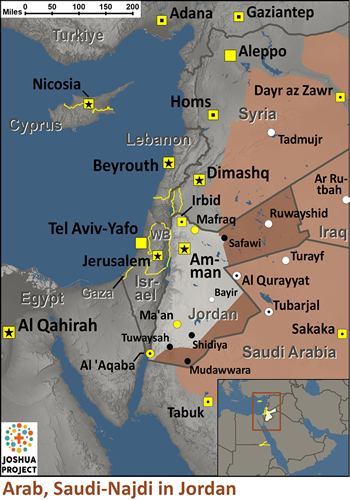The Najdi tribe straddles what we call Arabs and what we call Bedouins, so we call them Bedouin Arabs. They consider their traditional homeland to be the Arabian Desert; however, some Bedouin groups have migrated north into the Negev Desert region.
Today many Bedouins still live in Jordan, one of the first lands their ancestors inhabited, primarily raising sheep and goats. Nadji Bedouin Arabs have a relatively harsh existence. They have no permanent homes but live in portable, black tents made from woven goat hair.
Najdi Arabs are Sunni Muslims who believe that the supreme God, Allah, spoke through his prophet, Mohammed, and taught mankind how to live a righteous life through the Koran and the Hadith. To live a righteous life, you must utter the Shahada (a statement of faith), pray five times a day facing Mecca, fast from sunup to sundown during the month of Ramadan, give alms to the poor, and make a pilgrimage to Mecca if you have the means. Muslims are prohibited from drinking alcohol, eating pork, gambling, stealing, slandering and making idols. They gather for corporate prayer on Friday afternoons at a mosque, their place of worship.
The two main holidays for Sunni Muslims are Eid al Fitr, the breaking of the monthly fast and Eid al Adha, the celebration of Abraham's willingness to sacrifice his son to Allah.
Sunni religious practices are staid and simple. They believe that Allah has pre-determined our fates; they minimize free will.
In most of the Muslim world, people depend on the spirit world for their daily needs since they regard Allah as too distant. Allah may determine their eternal salvation, but the spirits determine how well we live in our daily lives. For that reason, they must appease the spirits. They often use charms and amulets to help them with spiritual forces.
Little or no Christian witness exists for them, nor any example of living Christianity for the Najdi Arabs to see or experience.
Pray for these remote Muslims to have dreams and visions of the risen Savior and be drawn to him.
Pray for workers who are willing to endure hardships, learn a difficult language, and produce gospel materials for these people who need to hear good news.
Pray for the rapid spread of the gospel among the Nadji Bedouin Arabs.
Scripture Prayers for the Arab, Saudi - Najdi in Jordan.
| Profile Source: Joshua Project |


























